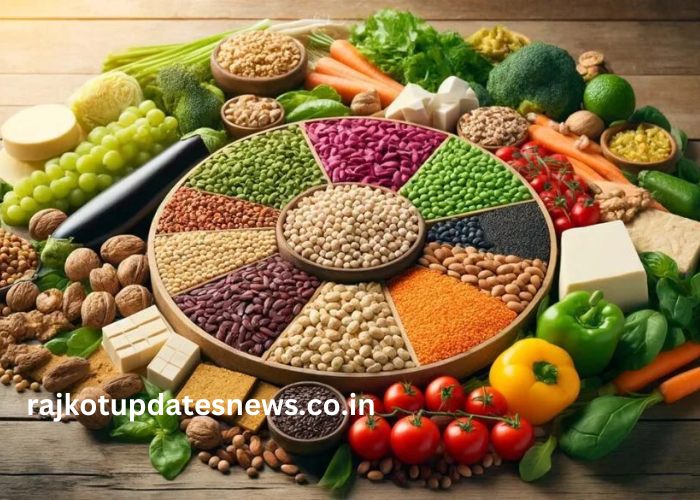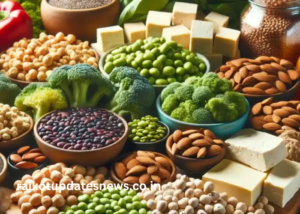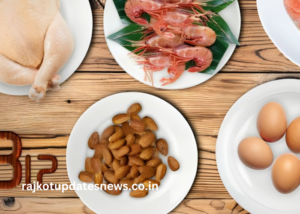
As the world increasingly shifts toward plant-based diets, the demand for quality vegetarian protein sources has never been higher. A well-balanced vegetarian diet can provide all the necessary nutrients, including protein, which is essential for muscle growth, tissue repair, and overall health.
The wellhealthorganic.com: vegetarian protein source archives serves as a comprehensive resource for exploring various plant-based protein options.
In this guide, we will delve into the significance of protein in a vegetarian diet, highlight various sources, and answer common questions regarding vegetarian protein intake.
By understanding the nutritional benefits and options available, individuals can make informed dietary choices that support their health and lifestyle.
Key Points
- Vegetarian protein sources are abundant and diverse, catering to various dietary preferences.
- Properly combining plant proteins can yield complete amino acid profiles.
- A balanced vegetarian diet can meet all protein requirements without meat.
Why Is Protein Important in a Vegetarian Diet?
Protein plays a vital role in numerous bodily functions. Here’s why it is especially important for those following a vegetarian diet:
- Muscle Repair and Growth: Protein is essential for repairing tissues and building muscle, making it crucial for athletes and active individuals.
- Hormonal Balance: Proteins serve as building blocks for hormones, which regulate various physiological processes.
- Immune Function: Antibodies, which are proteins, play a critical role in the immune system, helping the body fight off infections.
For vegetarians, ensuring adequate protein intake is essential to maintain overall health and well-being.
What Are the Best Vegetarian Protein Sources?
There are numerous vegetarian protein sources to choose from, each offering unique nutritional benefits. Here’s a table highlighting some of the best sources:
| Source | Protein Content (per 100g) | Additional Nutrients |
| Lentils | 9g | Fiber, iron |
| Chickpeas | 9g | Fiber, manganese |
| Quinoa | 4g | Complete protein, magnesium |
| Tofu | 8g | Calcium, iron |
| Greek Yogurt | 10g | Probiotics, calcium |
| Peanuts | 25g | Healthy fats, vitamin E |
These sources not only provide protein but also contribute essential vitamins and minerals.
How Can Legumes Be Incorporated into Meals?
Legumes, such as beans, lentils, and peas, are excellent vegetarian protein sources. Here are some ways to incorporate them into your meals:
- Soups and Stews: Add lentils or beans to soups and stews for a protein boost.
- Salads: Toss chickpeas or black beans into salads for added texture and nutrition.
- Dips: Create bean-based dips like hummus for a healthy snack option.
Note: Experimenting with different recipes can make it easier to enjoy legumes.
What Is the Role of Nuts and Seeds in a Vegetarian Diet?
Nuts and seeds are nutrient-dense foods that offer not only protein but also healthy fats. Here’s how they contribute:
- Protein-Rich: Many nuts and seeds, such as almonds and chia seeds, provide substantial protein per serving.
- Healthy Fats: They contain unsaturated fats, which support heart health and help in nutrient absorption.
- Versatility: Nuts and seeds can be easily added to smoothies, salads, or baked goods.
Including a variety of nuts and seeds in your diet can enhance your overall nutrient intake.
How Do Whole Grains Contribute to Protein Intake?
Whole grains are often overlooked as a protein source, but they play a significant role in a vegetarian diet. Here’s how:
- Moderate Protein Content: Grains like quinoa and farro contain a decent amount of protein alongside carbohydrates.
- Fiber-Rich: Whole grains are high in fiber, which aids digestion and promotes satiety.
- Versatile Ingredients: They can be used in a variety of dishes, from salads to grain bowls.
Combining whole grains with legumes can provide a complete protein profile.
Can Dairy and Eggs Be Included in a Vegetarian Diet?
For lacto-ovo vegetarians, dairy products and eggs can serve as significant protein sources. Here’s the breakdown:
- Dairy Products: Items like Greek yogurt, cheese, and milk are rich in protein and calcium.
- Eggs: A complete protein source, eggs provide all essential amino acids necessary for health.
Including these animal products in moderation can enhance protein intake while maintaining a vegetarian diet.
How to Create a Balanced Vegetarian Meal Plan?
Creating a balanced vegetarian meal plan involves incorporating a variety of protein sources. Here’s a sample plan:
- Breakfast: Smoothie with Greek yogurt, spinach, and a banana.
- Lunch: Quinoa salad with chickpeas, diced vegetables, and a lemon vinaigrette.
- Dinner: Lentil stew served with whole-grain bread.
- Snacks: Hummus with carrot sticks or a handful of mixed nuts.
Note: Variety is key to ensuring you get a wide range of nutrients.
How Important Is Protein Pairing?
Protein pairing is a concept that involves combining different plant-based proteins to ensure a complete amino acid profile. Here’s why it matters:
- Completeness: Some plant proteins lack one or more essential amino acids. Pairing them can help achieve balance.
- Examples of Pairings:
- Rice and beans
- Hummus and whole-grain pita
- Peanut butter on whole-grain bread
These combinations ensure that your body receives all necessary amino acids for optimal health.
How Do Plant-Based Protein Powders Fit In?
Plant-based protein powders are a convenient way to boost protein intake, especially for athletes or those with higher needs. Here’s what you need to know:
- Types: Common options include pea protein, brown rice protein, and hemp protein.
- Versatility: They can be added to smoothies, oatmeal, or baked goods.
- Supplementation: While whole foods are preferred, protein powders can help fill gaps in your diet.
Note: Always choose high-quality protein powders with minimal additives.
What Are the Benefits of a Vegetarian Diet?
Adopting a vegetarian diet can offer numerous health benefits beyond just protein intake:
- Heart Health: Lower cholesterol levels and reduced risk of heart disease.
- Weight Management: Vegetarian diets tend to be lower in calories, helping with weight control.
- Improved Digestion: High fiber content from plant-based foods promotes healthy digestion.
These benefits contribute to overall well-being and can enhance longevity.
How to Read Nutrition Labels for Vegetarian Products?
Understanding nutrition labels is crucial for making informed dietary choices. Here’s what to look for:
- Protein Content: Check the grams of protein per serving.
- Ingredients List: Look for whole food ingredients and avoid products with excessive additives.
- Serving Size: Be aware of the serving size to accurately assess nutrient content.
Note: Familiarizing yourself with labels can improve your food choices.
What Are Common Myths About Vegetarian Protein Sources?
Several myths surround vegetarian protein sources that can mislead individuals. Here are a few:
- Myth 1: Plant proteins are inferior to animal proteins.
- Myth 2: It’s difficult to get enough protein on a vegetarian diet.
- Myth 3: Vegetarians cannot build muscle effectively.
Understanding the facts can help dispel these misconceptions and encourage a balanced approach.
How Do Cultural Practices Influence Protein Choices?
Cultural practices can significantly affect vegetarian protein sources. Here’s how:
- Regional Ingredients: Different cultures emphasize various legumes, grains, and nuts based on local availability.
- Traditional Recipes: Many traditional dishes are rich in plant-based proteins, promoting their consumption.
- Festivals and Celebrations: Certain occasions may highlight vegetarian dishes that are protein-rich.
Embracing cultural diversity can enhance the vegetarian diet’s nutritional profile.
What Role Do Supplements Play in a Vegetarian Diet?
Supplements can be beneficial for vegetarians, especially in addressing potential nutrient deficiencies. Here’s a breakdown:
- Vitamin B12: Crucial for nerve function and energy production; often lacking in vegetarian diets.
- Iron: Plant-based iron is less bioavailable, so supplements may be necessary for some individuals.
- Omega-3 Fatty Acids: Algal oil is a plant-based source of omega-3s that can support heart health.
Note: Consult a healthcare provider before starting any supplements.
How to Transition to a Vegetarian Diet?
Transitioning to a vegetarian diet can be a gradual process. Here are some tips to ease the transition:
- Start Slow: Begin by eliminating meat a few days a week and gradually increase the number of meatless meals.
- Explore New Recipes: Try out new vegetarian recipes to discover what you enjoy.
- Educate Yourself: Learn about nutrition to ensure a balanced diet.
Note: Be patient with yourself during this transition.
Conclusion
In summary, wellhealthorganic.com: vegetarian protein source archives offers valuable insights into the vast array of vegetarian protein options available. From legumes and nuts to dairy and grains, there are numerous ways to incorporate protein into a vegetarian diet. Understanding how to balance these sources and the importance of nutritional variety is essential for maintaining health and wellness. With the right knowledge and resources, anyone can thrive on a vegetarian diet while enjoying the numerous health benefits it offers.
FAQ’s
1. What are the best vegetarian protein sources?
The best sources include lentils, chickpeas, quinoa, tofu, and Greek yogurt.
2. How much protein do I need on a vegetarian diet?
Protein needs vary by individual, but generally, adults require about 46-56 grams per day.
3. Can I get enough protein without meat?
Yes, a well-planned vegetarian diet can provide all necessary protein.
4. How can I combine plant proteins effectively?
Pair legumes with grains, such as rice and beans, to create complete proteins.
5. Are protein powders necessary for vegetarians?
Not necessarily, but they can be convenient for those with higher protein needs.
6. What role do nuts play in a vegetarian diet?
Nuts provide healthy fats, protein, and essential nutrients.
7. How important is meal planning for vegetarians?
Meal planning helps ensure balanced nutrition and adequate protein intake.
8. Can I get enough iron from vegetarian sources?
Yes, but pairing iron-rich foods with vitamin C can enhance absorption.
9. What are some high-protein vegetarian snacks?
Snacks like hummus, nut butter, and yogurt are great options.
10. How can I ensure I get all essential amino acids?
By combining different plant proteins throughout the day, you can achieve a complete amino acid profile.


